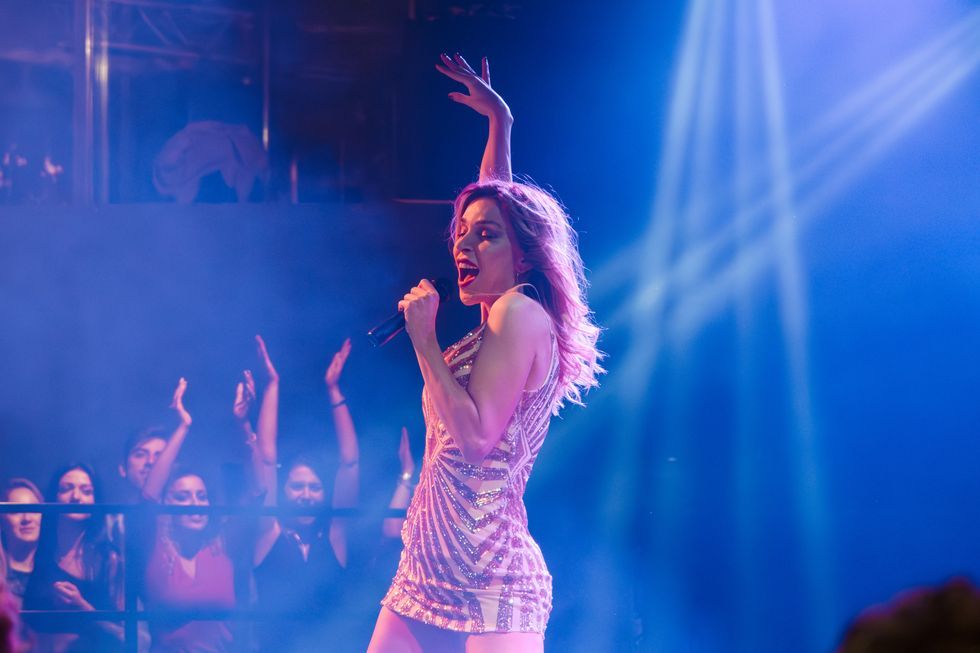It arrived in streaming on May 29th on Netflix The life you wanteda series like no other on the Italian or even international scene: it talks about an AMAB (Assigned Male at Birth) woman who has to deal with a past that she thought was outdated and which forces her to question everything she has built. Except for one thing: herself. The protagonist of this series written by Ivan Cotroneo and Monica Rametta is Vittoria Schisano, who in Gloria has put pieces of her life, fragments of ours and glimpses of a more inclusive future that we will only be able to conquer by fighting together. Because, as you told a Cosmopolitan in Pride month, «finally finding a character like her on TV is a caress for everyone who watches this series and who is still watching it all over the world.” Born in 1977, born in Pomigliano d’Arco and reborn 10 years ago after the conclusion of the transition process which today makes her wake up every morning grateful for this “second chance” that life has given her, Vittoria aims high, in work and in private life, because «there is no going back and rights must belong to everyone, otherwise they are just privileges». We talked with her about success on Netflix, about collective responsibility and change and above all about love. Because we all “want to be loved, understood, welcomed. And have our space in the world.”
Vittoria, we’ll talk to you a few weeks after the debut of the series. Is everything as you expected?
“Even better! I am flooded with affection from all parts of the world: receiving this consensus is strange, but it also made me understand that everyone, regardless of latitude, needs the exact same answers, we all want to be welcomed, loved, embraced. Beyond the personal story of the protagonist, the series tells a universal story, a family story, a love story, at the center of the scene is a person who did not have an easy life and who demanded with extreme commitment the life he dreamed of. Her story speaks to everyone, without social or gender distinction. Furthermore, in this political moment in which the space to demand what is rightfully ours is being taken away from us, listening to stories like Gloria’s is of vital importance.”
There will be a before and after Gloria, at least in the world of television entertainment. How does it make you feel to be the protagonist of this change?
«When I read the script I immediately realized the importance of these characters. In the narrative path of our country and perhaps the entire world, an AMAB protagonist told without the eye of prejudice was missing. Gloria is a woman who is given the opportunity to make mistakes, to fail, to have defects like everyone else. There was, obviously, the risk of making her a saint, or of mocking her. But luckily it didn’t happen like that. And the fact that she is an AMAB woman is just one of the thousands of nuances that every character should have. Gloria is truly a watershed: I hope she is a starting point towards change.”
Was it more difficult to enter into Gloria’s life in the areas in which it resembles yours the least or in those in which it resembles her the most?
“The second. From an actress I draw on the truth and my life. And when this truth is strong and important, then the overlap becomes more intense. Of course Gloria and I are different, compared to her I am more romantic, more naive, she is more cynical: this helped me, it gave me greater awareness, in the overlap I gave her fragility, I helped her to come out from the screen of his pride. The most complex part was describing the violence, Gloria’s and mine: I had never done it before. This series gave me the opportunity to free myself from the sense of guilt that I carried for a long time about what I had suffered.”
When the project was proposed to you, were you afraid to entrust this story, which also tells a part of yours, to others?
«No, not at all, in fact I thought: ‘Finally’. And for two reasons: I have known Ivan for many years, I know his sensitivity and his writing, I trusted him. And then this is a series that, as a viewer, I would have liked to watch. I don’t hide from you that before The life you wanted I rejected many roles, I didn’t like them, some embarrassed me. I think that seriality, in this historical moment, has the power to educate where school or family are lacking. I feel a responsibility that I couldn’t ignore. Kids today are abandoned to self-education, it all happens through social media, they learn sex by watching porn videos. Very high, impossible, frustrating expectations are created. If seriality offers honest and true series like this, so be it.”
We are in June, Pride month. 30 very important days. Is there a way in your opinion to make the activism and interest in these issues last all year?
«We must all feel co-responsible for the life we live and want. Learn to think: ‘Your rights are also my rights’, and vice versa. When I leave the bubble of my personal needs and think about the rights of my neighbors, that’s where I do something for myself. And a politician who does not start from this approach, who speaks only to give grist to his party’s mill and not for the entire country, does not deserve to do this job. I know it may seem utopian, but the country will only change when we take to the streets every day, when we all go to vote, it’s an enormous responsibility that even those who don’t vote take on. Everyone has the right to happiness: we should fight for this.”
Today’s kids are less afraid of revealing themselves, of talking about identity and claiming their own. At least they try with all their might. How was your adolescence?
«True, today they have a different freedom, reading helps them, seriality helps them, especially when they watch a series that truly represents the world. When I came out to my mother she was scared because it had a certain iconography of homosexuality as a reference, cinematography had contributed to cementing the stereotype of her within her. For this reason we should change the representation of her: with her the collective conscience also changes.”
10 years have passed since your rebirth as Vittoria. How do you feel different from then and how do you feel the same?
«The biggest difference is that I feel happy, I am brighter, every morning I wake up, I look in the mirror and I am grateful for my second chance. I thank myself above all, because at a certain point I had the awareness that life was one and that living it halfway would have been a waste. Ten years later I learned to show myself with my fragilities, to show myself on social media without a filter. The most beautiful thing I carry with me today is my truth.”
And how has the world around you changed?
«I believe that the world has changed for the better, I believe that when you stop telling a lie and finally tell the truth you also remove the prejudice of those around you. When I was 15 I hid behind a finger, then when I asserted myself even the chatter around me faded. Only in politics have we taken steps backwards: it reflects and talks about a country that doesn’t exist, it plays on fears and human limits. And it is precisely the people who are least afraid who have to take to the streets and vote. Because we can no longer accept someone telling us that we cannot have an abortion, that we cannot be or love who we want.”
Pope Francis’ unfortunate choice of words about gay seminarians has made headlines around the world. An episode that makes us reflect on how important words are, especially when it comes to welcome and inclusion. What weight do you give to words?
«Words describe the world and have a specific weight and each generation has its own load of responsibility in trying to change the narrative. We have lived for centuries in a misogynistic culture, today that is no longer the case we must support this new world with common thoughts, words and actions.”
What will your post-Gloria be like?
«Several projects are arriving, but if before I already censored many and didn’t accept as many, today I’m even more selective. I can’t go back after that The life you wanted. I would like to tell beautiful stories: regardless of whether the protagonist is AMAB or not, I would like to have the opportunity to play women with a beautiful story that can help those who watch it.”








